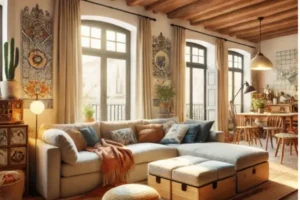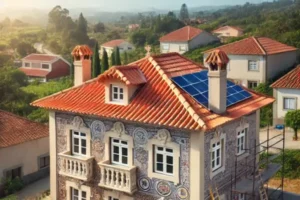Portugal is more than a destination—it’s a lifestyle that promises sun-soaked days, vibrant culture, and a safe, welcoming environment for families. For expatriates dreaming of a fresh start, the country’s rich variety of affordable homes, from rustic countryside cottages to historic village properties, offers a chance to create something truly unique.
Renovating a property in Portugal isn’t just about turning a house into a home; it’s an opportunity to embrace the charm of Portuguese living while crafting a space tailored to your family’s needs. With careful planning and the right team, even the most budget-conscious buyers can transform fixer-uppers into dream homes without breaking the bank.
Before you dive in, however, it’s essential to understand Portugal’s renovation process—its laws, culture, and hidden opportunities. A little preparation can save time, money, and stress, ensuring your journey to settling down in this incredible country starts on the right foot.
Why Renovate in Portugal?
For expatriates seeking a family home in Portugal, renovation offers a chance to blend affordability with creativity. Instead of settling for a move-in-ready property that may not fit your vision or budget, you can transform an older or neglected property into a custom sanctuary. Renovation in Portugal isn’t just practical—it’s a rewarding investment in both lifestyle and long-term value.
1. Benefits of Renovating vs. Buying a Move-In-Ready Home
- Lower Initial Costs: Move-in-ready homes often come with a premium price tag. By opting for a property in need of work, you can save significantly on the purchase price and allocate your budget toward renovations tailored to your needs.
- Creative Freedom: Renovation gives you the freedom to design a home that suits your family’s lifestyle, whether it’s adding extra bedrooms, creating an open-plan kitchen, or embracing traditional Portuguese design elements.
- Building Equity: Properties with renovation potential often appreciate in value quickly, particularly in sought-after regions. This can make your home not only a personal asset but also a smart financial decision.
2. Unique Opportunities in Portugal’s Property Market
- Historical Charm: Portugal is rich in architectural heritage, with centuries-old townhouses, stone cottages, and farmhouses waiting to be revitalized. Renovating these homes allows you to preserve their character while modernizing for comfort.
- Rural Escapes: In Portugal’s interior regions, such as Alentejo or the Douro Valley, you’ll find affordable properties surrounded by natural beauty. These areas offer peace, space for gardens or animals, and a slower pace of life perfect for raising a family.
- Coastal Villas: Portugal’s coastline is dotted with properties that can be transformed into idyllic seaside homes. Whether you’re looking at the Algarve or the Silver Coast, renovation offers a chance to secure a property in highly desirable areas at a fraction of the cost.
3. Financial Incentives and Long-Term Value
- Renovation Subsidies and Tax Breaks: Portugal offers programs that encourage property restoration, particularly for heritage or rural homes. These can help offset renovation costs significantly.
- Energy Efficiency Upgrades: Renovating is an opportunity to modernize your home with energy-efficient solutions, which can reduce utility bills and increase your property’s value in the long term.
- Rental Income Potential: If your plans include renting out your property, renovated homes in Portugal’s most popular regions can generate significant income, especially during the tourist season.
Renovating in Portugal is more than just an affordable option—it’s an opportunity to immerse yourself in the country’s charm and history while building a home that reflects your family’s needs and dreams. With so many unique possibilities, the potential rewards make it well worth the effort.
Navigating Portuguese Property Laws and Regulations
Renovating a property in Portugal is an exciting opportunity, but understanding the legal landscape is essential to avoid costly surprises. From property ownership laws to specific renovation permits, knowing the rules will keep your project on track and your investment secure. Here’s what you need to know before getting started.
1. Key Legal Aspects When Buying Property in Portugal
- Property Deeds and Registrations: Before purchasing a property, ensure it’s registered correctly in the Conservatória do Registo Predial (Land Registry) and that the seller has legal ownership. Check for any debts or encumbrances tied to the property.
- Property Identification Numbers: Verify the property’s official identification numbers, such as the Número de Identificação Fiscal (NIF) and cadastral number, to ensure the property is legally recognized and properly taxed.
- Hire a Lawyer: Engaging a local lawyer who understands property laws and speaks your language is invaluable. They’ll help you navigate contracts, taxes, and negotiations with confidence.
2. Required Permits for Renovation Projects
- Licensing for Structural Changes: Renovations involving structural alterations (e.g., knocking down walls, changing the roof, or adding extensions) require a permit from the local Câmara Municipal (Municipality).
- Planning Permissions: If your property lies in a heritage zone or environmentally protected area, stricter guidelines apply. These may include limits on façade changes, materials used, or even paint colors.
- Energy Efficiency Certification: For major renovations, you’ll need to ensure compliance with energy efficiency standards and obtain an Energy Performance Certificate (EPC) before completion.
- Working with Architects and Engineers: Licensed professionals are often required to draft and submit renovation plans to the municipality, particularly for extensive projects.
3. Navigating Heritage Restrictions and Local Municipalities
- Protected Properties and Zones: Many older properties, particularly in historic areas, are protected under Portuguese law. Renovations must align with heritage guidelines, which may restrict alterations to architectural elements or require the use of traditional materials.
- Dealing with Bureaucracy: While Portuguese municipalities are generally helpful, navigating the permitting process can be time-consuming. Be prepared for delays and factor these into your renovation timeline.
- Build Relationships Locally: Developing a rapport with local officials and neighbors can go a long way. Familiarity with the community often smoothens processes and opens doors to local insights and recommendations.
By understanding the legal framework and working closely with professionals and local authorities, you’ll ensure your renovation is not only compliant but also set up for success. This preparation will allow you to focus on bringing your dream home in Portugal to life without unnecessary roadblocks.
Finding the Right Property
The first step in your renovation journey is selecting the perfect property to transform into your family’s home. While Portugal offers a wealth of affordable options, knowing what to look for—and what to avoid—can save you time, money, and stress. A little due diligence upfront will set you on the right path.
1. Tips for Identifying Properties with Good Renovation Potential
- Focus on Location: Choose areas that align with your family’s lifestyle, whether it’s a peaceful countryside retreat, a bustling village, or a seaside escape. Proximity to schools, healthcare, and amenities is especially important for families.
- Look for Solid Bones: Properties with a strong structural foundation are easier and more cost-effective to renovate. Look for houses with intact walls, roofs, and layouts that suit your vision.
- Consider Utility Access: Check for access to water, electricity, and sewage systems. Renovating a home without these essentials can add significant costs and complications.
- Assess Potential ROI: While your family’s needs come first, consider the property’s potential to appreciate in value, especially if located in a desirable or up-and-coming area.
2. Red Flags to Watch For
- Structural Issues: Cracks in walls, sagging roofs, or uneven floors can signal serious problems that require costly repairs. Always inspect for signs of water damage, mold, or termites.
- Inaccessible Locations: Properties in remote areas may seem idyllic but could pose challenges for daily living, including limited access to shops, schools, and medical facilities.
- Excessive Renovation Needs: While some wear and tear is expected, properties requiring extensive rebuilding may exceed your budget or timeline. Make sure the scale of work aligns with your goals and resources.
- Unclear Legal Status: Avoid properties with unclear ownership, boundary disputes, or incomplete paperwork. Ensuring the property is legally sound is critical before purchase.
3. Importance of Hiring a Property Surveyor or Engineer
- Professional Assessment: A surveyor or structural engineer can identify hidden issues that aren’t visible during a basic inspection, such as foundation instability, plumbing problems, or electrical risks.
- Accurate Cost Estimates: These professionals can help you estimate the renovation costs accurately, ensuring your project remains within budget.
- Navigating Local Regulations: Surveyors familiar with Portuguese property laws can advise on what is feasible for renovations, including required permits and compliance with zoning laws.
- Peace of Mind: Investing in expert advice early can save you from unexpected surprises down the road, making the entire renovation process smoother and less stressful.
Finding the right property is about balancing your vision with practical considerations. By spotting the right opportunities, avoiding major pitfalls, and consulting experts, you’ll lay the foundation for a successful renovation project—and your new life in Portugal.
Building a Trusted Team
A successful renovation in Portugal starts with assembling a team of reliable professionals who understand your vision, budget, and timeline. Finding the right architects, contractors, and designers can make all the difference in turning a renovation project into the home of your dreams. Here’s how to approach this essential step.
1. How to Find Reputable Architects, Contractors, and Designers
- Tap Into Local Networks: Start by asking for recommendations from locals, expatriate communities, or real estate agents. Personal referrals are often the best way to find trusted professionals.
- Research Online Platforms: Websites such as Houzz, LinkedIn, and local directories can help you identify architects and contractors with solid portfolios and positive reviews. Look for professionals with experience in renovating older Portuguese properties.
- Verify Credentials and Experience: Ensure any architect or contractor you hire is licensed and insured. Ask to see examples of past projects, particularly ones similar in scope or style to your renovation.
- Meet in Person: Whenever possible, meet potential team members on-site to discuss your project. This gives you a sense of their communication style and ability to understand your goals.
2. The Value of Working with English-Speaking Professionals
- Avoid Miscommunication: Language barriers can lead to costly misunderstandings during the renovation process. Working with professionals fluent in English ensures that your expectations are clearly communicated and understood.
- Ease of Navigation: English-speaking architects and contractors familiar with expat needs can help you navigate local regulations, permits, and suppliers more efficiently.
- Cultural Mediation: Professionals who understand both Portuguese and expatriate perspectives can bridge cultural gaps, making the process smoother and less stressful for your family.
3. Understanding Portuguese Work Culture and Communication Styles
- Patience Is Key: Portuguese work culture often emphasizes relationships and trust, which means that timelines may feel more flexible than in other countries. Build in extra time for approvals and project milestones.
- Direct but Respectful Communication: Be clear about your expectations, but remain respectful and patient. A collaborative approach will foster goodwill and better results.
- Trust Local Expertise: While you may have a clear vision, your team’s local knowledge about materials, design, and construction practices can be invaluable. Be open to their suggestions—they often know what works best in Portugal’s climate and regulatory framework.
- Frequent Check-Ins: Regularly visit the site or schedule updates with your team to stay informed about progress and resolve any issues quickly.
Building a trusted team takes effort, but it’s one of the most important investments in your renovation project. With the right professionals by your side, your dream home in Portugal will not only meet your expectations but may even exceed them.
Budgeting and Financing Your Renovation
Renovating a home in Portugal is an exciting project, but setting a realistic budget and securing the right financing are key to avoiding financial stress. By understanding typical costs, exploring funding options, and planning for contingencies, you can turn your vision into reality while keeping your finances on track.
1. Typical Renovation Costs in Portugal
- General Cost Ranges: Renovation costs in Portugal vary depending on the scope of work, property type, and location.
- Basic Updates: painting, flooring, minor repairs.
- Moderate Renovations: kitchen and bathroom upgrades, structural changes.
- Full Renovations: restoring older homes, major rebuilds.
- Regional Differences: Costs can be higher in urban areas like Lisbon or Porto and lower in rural regions. Always factor in local labor rates and material availability.
- Energy Efficiency Upgrades: Adding insulation, solar panels, or modern heating systems can save on long-term energy costs but may increase upfront expenses.
2. Financing Options for Renovations
- Portuguese Banks: Many local banks offer renovation-specific loans or mortgages that include funds for property improvements. Look for options with competitive rates and repayment terms suited to your budget.
- International Financing: If you have access to financing in your home country, compare these rates with Portuguese lenders. Some expatriates may find better terms through international banks or lenders specializing in expat services.
- Government Incentives: Depending on the property type or location, you may qualify for grants or low-interest loans aimed at preserving heritage properties or improving energy efficiency. Check with local municipalities or regional programs for details.
- Personal Savings: While financing is an option, using personal savings for part of the renovation can reduce reliance on loans and keep long-term costs lower.
3. Tips for Managing Unexpected Costs and Delays
- Add a Contingency Budget: Allocate at least 10–20% of your renovation budget for unexpected expenses. Structural issues, permit delays, or material shortages are common surprises during renovations.
- Get Detailed Quotes: Request itemized quotes from contractors to understand exactly what’s included in the price. This transparency reduces the risk of unexpected charges.
- Phase the Work: If your budget is tight, consider tackling renovations in stages. Prioritize essential repairs and upgrades, leaving non-urgent projects for later.
- Monitor Progress Regularly: Stay actively involved in your project by scheduling regular site visits and updates from your contractor. Catching potential issues early can help prevent costly delays.
- Insure Your Renovation: Ensure the property is covered by insurance during the renovation process to protect against unforeseen damages or accidents.
Budgeting for a renovation in Portugal requires careful planning, but with clear goals and the right financial strategy, you can create a home that fits your needs and your family’s future. Thoughtful preparation will help you balance cost, quality, and peace of mind throughout your renovation journey.
Adapting to Local Design Trends and Practicalities
Renovating a home in Portugal offers a unique chance to blend the country’s rich design heritage with modern functionality. By integrating local styles, prioritizing sustainability, and making practical adaptations for family living, you can create a home that feels authentically Portuguese while meeting your family’s needs.
1. Integrating Traditional Portuguese Design Elements
- Azulejos (Decorative Tiles): Portuguese tiles are iconic and can be used to add charm to kitchens, bathrooms, or even outdoor areas. Whether you choose classic blue-and-white patterns or modern interpretations, they bring a touch of local culture to your home.
- Terracotta and Stone Materials: Embrace natural materials such as terracotta floors or stone walls, which are not only timeless but also help regulate indoor temperatures in Portugal’s warm climate.
- Wooden Shutters: Traditional wooden shutters, or portadas, not only enhance the home’s aesthetics but also provide insulation and privacy.
- Arched Doorways and Windows: Incorporating arches into your renovation design adds a classic Mediterranean feel and reflects the architectural history of Portuguese homes.
2. Balancing Aesthetics with Energy Efficiency and Sustainability
- Insulation and Ventilation: Many older homes in Portugal lack insulation. Invest in modern insulation materials and natural ventilation systems to improve comfort and reduce energy consumption.
- Solar Panels: Portugal’s abundant sunshine makes solar panels a smart choice. They reduce energy costs and contribute to sustainability while adding long-term value to your property.
- Eco-Friendly Materials: Opt for locally sourced, sustainable materials like cork (a Portuguese specialty), recycled wood, or eco-friendly paints to align your renovation with green living principles.
- Efficient Windows and Doors: Double-glazed windows and well-sealed doors can modernize your home while maintaining traditional aesthetics, keeping energy bills manageable year-round.
3. Adapting Properties for Family Living
- Maximizing Outdoor Spaces: Portugal’s climate is perfect for outdoor living. Consider creating a shaded patio, garden, or play area for children. Adding a pergola or incorporating local plants like olive trees and bougainvillea can make the space inviting and low-maintenance.
- Modern Storage Solutions: Older Portuguese homes often lack built-in storage. Add custom cabinetry or modular solutions to make spaces more functional for a family.
- Open-Plan Living Areas: If the structure allows, opening up living spaces can create a more family-friendly flow, making it easier to keep an eye on kids while cooking or entertaining.
- Accessible Bathrooms and Bedrooms: Consider practical updates like ground-floor bathrooms or wider doorways, which make the home more family-friendly and accessible for all ages.
By embracing Portugal’s traditional designs and combining them with modern, sustainable updates, your renovated property will capture the country’s charm while providing the functionality your family needs. Thoughtful planning ensures that your home is not only beautiful but also practical and ready for everyday life in Portugal.
Managing Cultural and Lifestyle Adjustments
Renovating a property in Portugal isn’t just about the house—it’s about adapting to a new way of life. The process can differ significantly from what many expatriates are used to, especially regarding timelines and work culture. By understanding these differences and embracing Portugal’s relaxed lifestyle, you can make the renovation journey an enriching experience for your family.
1. How Renovation Timelines May Differ
- Pace and Priorities: In Portugal, renovation projects often move at a slower pace compared to countries with more rigid schedules. Factors like local holidays, labor availability, and a focus on building trust in professional relationships can cause delays.
- Permit Approvals: Obtaining permits from local municipalities can take longer than expected, especially in historic or rural areas. Patience is essential when dealing with Portuguese bureaucracy.
- Unexpected Delays: Suppliers, weather, or even cultural nuances can impact progress. Flexibility is key—build extra time into your project timeline to avoid frustration.
2. Practical Tips for Living in Portugal During Renovations
- Temporary Housing: Consider renting a nearby property during the renovation to avoid the stress of living in a construction zone, especially with a family. Look for short-term rentals that offer comfort and proximity to the site.
- Stay Involved: Regular site visits are crucial to monitor progress and communicate with contractors. Keep lines of communication open and clear, but remember that persistence pays off more than impatience.
- Build a Routine: Establish a routine for your family that includes exploring your local area. This helps everyone adjust to their new surroundings while staying grounded during the chaos of renovation.
- Keep Essential Services Functional: If you must live in the home during renovations, prioritize completing essential areas like the kitchen, bathroom, and bedrooms before moving in.
3. Embracing the Portuguese Way of Life
- Go With the Flow: Portugal is known for its laid-back lifestyle, and embracing this mindset can make the renovation process less stressful. Allow yourself to enjoy the slower pace and focus on building connections in your new community.
- Engage With Locals: Get to know your neighbors and local artisans. Their advice and recommendations can provide invaluable insights and even lead to faster problem-solving.
- Enjoy the Journey: Renovating your home is a chance to immerse yourself in Portuguese culture. From sourcing local materials to learning about architectural traditions, the process can deepen your connection to your new country.
- Take Breaks to Explore: When renovation stress builds, take advantage of Portugal’s beauty—visit nearby beaches, countryside, or cultural landmarks to recharge and remind yourself why you chose this incredible country.
By understanding and embracing the cultural and lifestyle differences in Portugal, you’ll navigate your renovation with less stress and more enjoyment. The process may challenge your patience at times, but it’s also an opportunity to create not just a home but a fulfilling new chapter for your family.
Common Mistakes to Avoid
Renovating a home in Portugal can be a deeply rewarding experience, but it’s not without its challenges. Avoiding common pitfalls ensures your project stays on track and that your new home fits seamlessly into your family’s lifestyle and its local surroundings.
1. Misinterpreting Local Regulations or Skipping Necessary Permits
- Overlooking Permits: Renovations requiring structural changes, extensions, or work in heritage areas demand specific permits from the local Câmara Municipal (Municipality). Failing to obtain these can lead to fines, legal disputes, or project halts.
- Navigating Zoning Laws: Certain regions, especially those with historical or environmental significance, have strict zoning rules. Ensure your renovation plans comply with these before breaking ground.
- Relying on Experts: Don’t assume you can navigate Portuguese property laws alone. A lawyer, architect, or local expert can clarify legal requirements and streamline the process.
2. Underestimating Renovation Costs or Failing to Hire Professionals
- Underestimating Budgets: Unexpected costs can arise from hidden issues such as structural damage or outdated plumbing. Always add a 10–20% buffer to your budget for contingencies.
- Skipping Professional Help: Attempting DIY projects or hiring unlicensed workers can lead to costly mistakes and unsafe results. Investing in qualified professionals ensures quality and compliance with regulations.
- Ignoring Maintenance Costs: While focusing on renovation, don’t forget about future maintenance. Older homes, in particular, may need ongoing repairs or upgrades.
3. Overlooking the Importance of Community Integration and Local Feedback
- Ignoring Neighbors’ Input: In smaller communities, renovations that disrupt the local aesthetic or use non-traditional materials can create friction. Engage with neighbors and seek feedback to maintain goodwill.
- Skipping Local Craftsmen and Suppliers: Utilizing local artisans and materials not only supports the community but also ensures your renovation blends authentically with its surroundings.
- Underestimating Community Ties: Building relationships with locals can provide practical benefits, from recommendations for reliable contractors to advice on navigating Portuguese work culture.
Avoiding these common mistakes is about preparation, communication, and a willingness to embrace local practices. By respecting regulations, investing wisely, and connecting with your new community, you’ll lay the groundwork for a successful renovation and a smooth transition into life in Portugal.
Embark on Your Dream Renovation in Portugal
Renovating a home in Portugal is more than just a project—it’s a chance to craft a space uniquely yours while embracing the beauty and culture of a new life abroad. For expatriates, it’s an opportunity to turn a house into a family haven, blending traditional Portuguese charm with modern comforts.
Proper preparation is the key to success. By doing your research, respecting local regulations, and assembling a trusted team, you’ll set the foundation for a smooth and rewarding renovation journey. While challenges may arise, the results—a home that reflects your dreams and lifestyle—are well worth the effort.
Are you ready to take the leap? Contact us today for expert advice, or share your renovation stories and tips. Let’s inspire each other to create the perfect homes in this stunning country we now call home!




